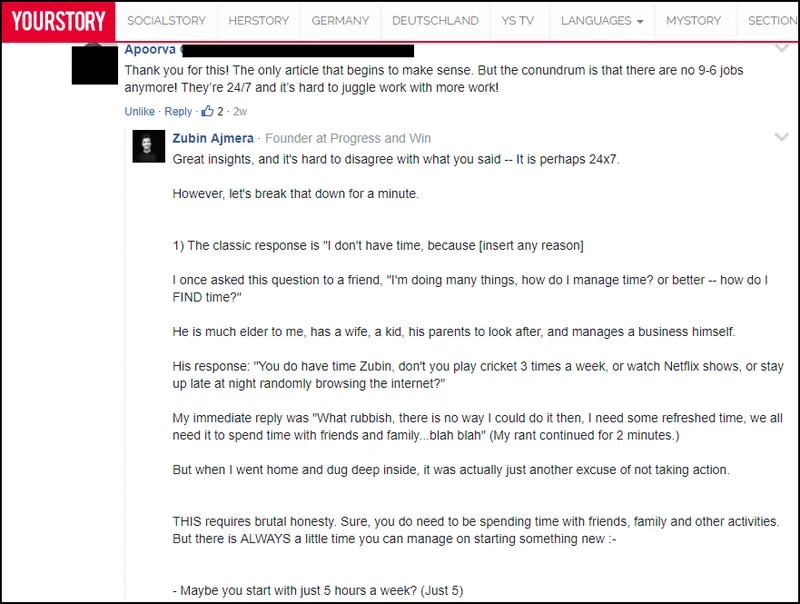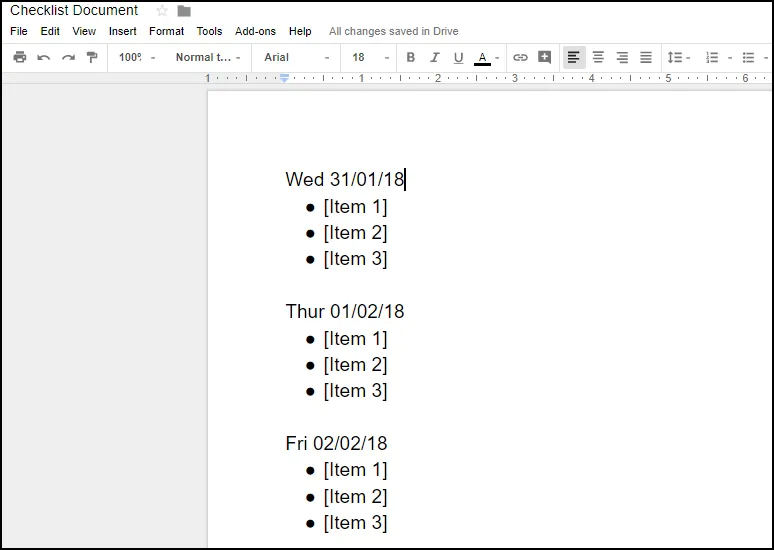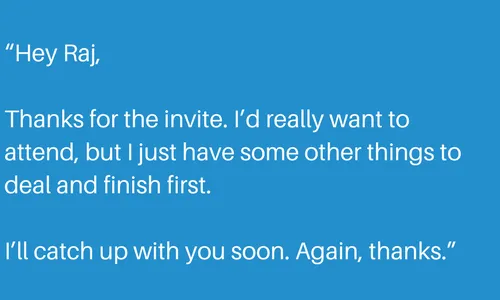‘But I’m already doing a full-time job. How do I find time to start a business?’
One of the most distressing questions in human behaviour is -- managing TIME. Try remembering the last time someone advised you to do something.

- "Why don't you go to the gym?",
- "Why don't you confront your bf/gf about your concerns?"
- "Why don't you speak to your manager?"
Same with business. If I ask you right now – “why don't you start a side business?” -- what is your natural knee-jerk reaction?
Let me guess -- "Yeah, I know I really should do that...someday...(takes a five second pause)...but I already have so much to do. I'm busy and I don't have time! So, maybe someday later"
That "someday" never happens. Slowly, you develop this vicious circle where you know you should be doing "that thing", yet you don't, and then you cover it up with the perennial "time" excuse.
Day by day, the distance between "what you should do" and "where you are now" gradually increases. Suddenly, you reach a stage where you simply shrug off and say "Uhh, never mind. Maybe this was meant to be! I'd rather remain happy with what I have."
In fact, one of our biggest weaknesses is you plan something first thing in the morning, and then you never complete it. It then goes in your “some other day” inbox.
Does this sound similar?
Instead, if there is a problem, the best people -- identify it -- acknowledge it, AND then (this is important) -- they take small steps to take action (rather than dreaming about it all day).
I recently wrote an article for YourStory (here is the full piece). After it went live, I personally engaged with everyone who had insightful comments. Here’s a good one:

Look closely, she says: "There are no 9-6 jobs anymore! They're 24x7 and it's hard to juggle work with more work!”
This is prevalent in each of our lives -- the conundrum of managing time. In fact, I get similar questions from my readers almost every day:

Maybe you're at a 9-6 job and you don't get time after work (you're exhausted), or you're usually free on the weekends, but you don't get time (you need to spend it with family and friends).
Don’t worry, I’m not going to pull out those inspirational quotes, such as “Just keep doing it”, “If you can dream it, you can achieve it!”
I care about achieving tangible results so, I'll show you three tactics today I use to find time, avoid procrastination, and get things done fast.
These have worked incredibly well for me, and if you even use one of these tactics, you’ll be able to free up an extra 5-10 hours a week. (which you then utilise in starting your own side business).
But first...
Before I jump into the tactical part, let me be super clear – you DO NOT have to quit your job to start a business. I’m with you and totally agree when you say: “It’s difficult to start something when you’re working full time.”
So, there is a reason I use the word “side” repeatedly over and over again, and that means you start something while still working at your job.
Maybe you find one to three clients and start working with them, or maybe you get a few sales. And when you’re confident enough, you have an option to quit your job.
As I’m writing this, I’m working on several ventures -- Industrial Inside, Progress and Win, 4 consulting/freelancing clients, 2 coaching students.
But who knows, tomorrow I may very well do a job AND keep my side ventures active. The point is to have multiple revenue channels, so you don’t rely on one source of income.
I was out for lunch with a friend who intends to start something. He has a well-paying job, but he still needs an extra income.
I asked “Why do you want to start a business?”
“Because I want an extra income”
“Aren’t you already earning well enough?”, I asked curiously.
Now, see his reply: “Yeah, I am. But I want something of my own. I feel if I can make a little extra, that would take care of my guilt-free expenses like bike repair, petrol, going out for movies, etc.”
(Okay. Fair enough so far.)
“Ahhhh, Ok. So, then what is stopping you? Why don’t you start taking the next step from say, tomorrow?”
AND, now see his reply -- “I don’t know, I just don’t have time!”
Isn’t this baffling? We have a problem, we know the solution -- and yet when presented with it, we LOVE to cover it up by the perennial reason -- “No I can't do that...I don’t have time!”
Let me show you three simple tactics to start applying today.
Tactic 1: the checklist document
This is what you do every day first thing in the morning -- You create what I call a ‘checklist document’. This is a simple document, and you list out only the topmost three to four things you need to do for that day.
Entrepreneur, author and speaker Tim Ferriss does something very similar, where he only focuses on the one to two important to-dos at the start of the day.
Remember, you only put the important items, because if you jot down everything, it becomes a to-do list.
Checklist document means these are the top three to four big things to get done by the end of the day. Let’s say you want to start a side business, so here are some examples you might include:
- Brainstorm a list of 10 ideas and write it down
- Research three to five places for your idea
- Check for demand, if anyone else is doing it too
- Talk to someone today who is doing something similar
- Email 10 potential prospects
Of course, these are just simple examples and you don’t need to do all at once.
Notice, how this isn’t some fancy productivity tool or an app. Ironically, most of the important things in life aren’t dependent on the right tools or technology -- it’s about setting up the mindset, and then actually DOING the work.
Action step:
- Create your checklist document (use a simple Google doc, so you can access it anytime you need.) Here's the link to Google Docs -- give a try.
- Write down your two to three most important tasks (out of the many you have already) for the day. Something like this:

Bad mindset: "I'm definitely motivated. I'm going to start doing this from next week" (Code for: You're not going to do anything)
Good mindset: "Looks interesting. Let me try this for the next two weeks and see the results for myself. I'm going to create one today and will be consistent on it for two weeks"
Tactic 2: the power of one
I’m a big proponent of It all starts with ONE. Let me break it down into two simple concepts:
Principle 1: Avoid the scroll-effect
How many times a day do you scroll through your Facebook newsfeed? Or your twitter? Or Netflix? In fact, also scrolling WhatsApp chats (and checking who changed dps? Common, let’s be honest!).
One minute you read a blog post “Top 7 ways to earn money online”, and the next minute you see an article “The best method to generate income.”
Ohh, and then somewhere someone shares this post -- “How to get 5000 facebook followers!”
(Your get excited -- “Ohh wow, let me read that QUICKLY!”)
What's going on?
This is a classic Scroll Effect -- we love to scroll second after second, then get distracted, and then get overwhelmed.
The worst part? You simply consume information after information, ending up doing nothing.
Rather, it takes tough discipline to not divert from 1057 different things, and follow the principle of ONE:
- Instead of following 15 blogs -- only read two to three and follow them deeply
- Instead of trying everything (Facebook, Twitter, Pinterest, etc.) -- only focus on one platform, go all-in on them, and ignore the rest
- Instead of listening to every blogger (“Do this, do that") -- only listen to the one to two people whose material you like and resonates with you
Principle 2: make one step progress
I’ve a lot of conversations with aspiring entrepreneurs which goes something like this:
Them: “So I want to earn money online. My goal is to make 1 lakh/month. What should I tell a prospective client when I meet them?”
Me: Great, so which stage are you at? How many clients are you working with right now?”
Them: “Oh, I don’t have a client as of yet. But I thought it’s good to know”
Are you serious? You’re micro-analysing something which is coming maybe three months down the road? You shouldn’t.
Say you’re going at a restaurant for dinner. When you enter it, do you think how much tip will you give after the dinner? Of course, not.
As you sit, you observe the ambience, watch the crowd, ask for the menu, etc.
Certain things need to be done at certain times:
- You can’t be a good guitarist in a year…if you’ve never held a guitar in your hand
- You won’t get six-pack abs in six months…if you’ve never been to the gym
- Of course, your manager won’t increase your salary…if you’ve only joined six to nine months before (stop complaining!)
You go from A to B to C to D to E and on and on. You don’t go from A to T to Z. Ok, ok enough of the analogies, you get the point.
Instead, start with ONE:
- Starting a business -- start with finding one idea, then test it for profitability
- Want to have 100 clients? -- start with getting your first one to three clients
- Want to earn 1 lakh/month? -- start with making 10k/month as a second income, and then you can scale it to 1 lakh
It all starts with ONE. Do not even conceive the thought of what’s coming one year from now. Focus on the thing which is in front of you right now.
Start small. Set tiny, realistic goals. That is the sign of a top performer.
Action step:
Create two buckets -- Distraction bucket and focus bucket.
- Distraction bucket: List of all the people, blogs, articles, etc., you encounter as you "scroll" through, but you'll NEVER take them seriously
- Focus bucket: List of a few people, articles, blogs, etc., which you take SUPER SERIOUSLY. That means you read each of their articles, follow their advice, reply to their emails, engage, take action, etc. Become their loyal fan.
Again, nothing fancy. Just do this simple exercise of creating two buckets in your mind right now. What do you watch every day? What do you read? Whom do you talk to daily? Which sites do you follow?
You can say “I don’t like this person, I’ll maybe just see what they have to say, but not take them seriously”
Or you might say “Man, THIS person gets me. I like what he says. I’m going to be following him meticulously!”
Tactic 3: say ‘no’ (use this word for word script)
Has this ever happened to you, where you don’t want to do something but still you say yes, and then 10 minutes later you regret saying yes to it?
I’ll give you an example.
I once got invited for a friend’s birthday dinner. This guy wasn’t my close friends or someone I hung out with regularly, but we knew each other through a mutual friend, and so he invited me for it.
“So, you’re joining us tonight for the dinner, right?” he asked.
“Sure, of course” my immediate response.
Now on the surface this looks OK -- you get invited for something, you want to go, and you should go. In fact, I love socialising and I’m sure you do too.
But deep down, I KNEW I didn’t want to go. It just so happened that there was an invitation and I felt “obligated” to attend.
This took me a long time to realise and also internalise -- It’s OK to say NO. Think about that for a minute.
It doesn’t necessarily mean you say no to every occasion (you shouldn’t.)
But, many times there will be situations or awkward moments where you just feel “obligated” to say yes, but in reality, you don’t want to do it at all.
- Weddings
- Family occasions
- Friends’ hang out
- Business opportunities
- Someone asks for help
- Office trips
- Your mom’s cousin’s daughter’s birthday (Do you even know her well?)
What if you could say NO to them? Maybe to one to two such time-wasters every week? Or a month?
Action step:
Identify your "time-wasters" -- activities you can say no to. It’s fine if you can’t identify any right now, but next time if you come across a situation where deep down you tell yourself -- “Uhhh, I don’t really want to say yes, but I guess it’s OK” -- Just stop, take a pause and use this short handy script:

Bonus tip: Send this to one person today, and tell me how it goes. I bet you'll be surprised with the results by just using this simple script.
Your turn
These are three super-simple tactics which you can start using immediately. Slowly you'll see results trickling in.
This article was originally published here.
(Disclaimer: The views and opinions expressed in this article are those of the author and do not necessarily reflect the views of YourStory.)







